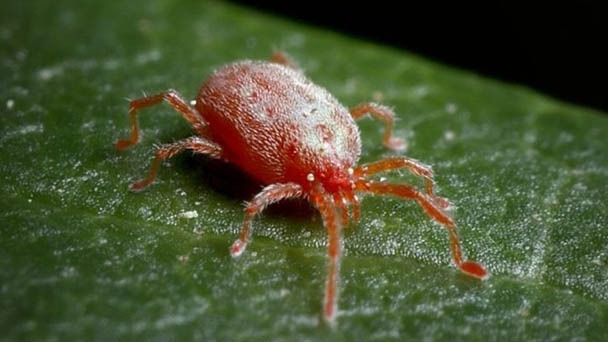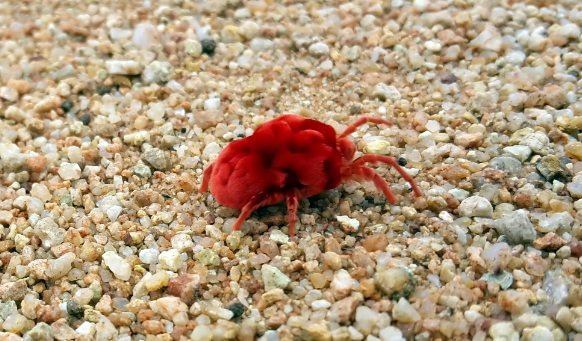How to Get Rid of Chiggers in Your Garden & Home - 2023 Guide
Written by Ivy
Jan 03 2023

Despite the fact that chigger bites are not harmful, the red bumps they leave behind can be extremely itchy. You can mount a successful defense against these bothersome mites by learning how to recognize chiggers and treat chigger bites.
- Use crack and crevice treatments indoors and a broadcast application of Supreme IT Insecticide outside to eradicate chiggers from your property.
- Various over-the-counter anti-itch medications and creams can help to relieve the itching from Chigger bites.
What Are Chiggers?
The arachnid family of insects includes tiny, red bugs called chiggers, as well as other names like chigger mites, harvest mites, and harvest lice. It takes a magnifying glass to see chiggers because they are too small to be seen with the unaided eye. Chigger larvae are what stings people with chiggers. Immediately after the eggs hatch, the larvae disperse to the nearby vegetation in search of food. They use their claws to attach to their host, pierce the skin with their feeding tube, and inject the host with digestive enzymes to liquefy the skin cells. Following the consumption of digested skin cells, chiggers depart the host and finish the larval stage by becoming eight-legged nymphs. They keep consuming plant life until they eventually mature into adult chiggers.
What Attracts Chiggers?
Chiggers live in dense vegetation and shaded areas. Grassy areas, wooded areas, swampy areas, and thickets are where they are most frequently found. In anticipation of an approaching animal or person, they frequently gather at the base of high grasses. Their active season will depend on where you live because they prefer warm, muggy climates. Chiggers can live all year in Florida, whereas they may only be active in Minnesota from late spring to early summer.
How to Get Rid of Chiggers in Your Yard
To stop chiggers from taking over your yard, you can take a number of precautions.
- Mow grassy areas, and pull weeds. Destroying their preferred habitats is the most efficient pest control method for getting rid of chiggers from your yard. This entails trimming back overgrown grassy areas and removing weeds from landscaping.
- Apply an organic pesticide. Chiggers can be efficiently eliminated by using a broad-spectrum application of an organic pesticide like diatomaceous earth. Datomaceous earth should be applied to hotspots in your yard or the area surrounding it. To get the active ingredients out of the treated areas, water them.
- Keep common host animals out. Chigger hosts frequently found in nature include squirrels, chipmunks, and other small mammals. If there are many of these animals in your yard, you might want to think about finding ways to lessen their presence. Building a fence, eliminating ponds or other water features, removing bird feeders, and locking trash cans can all help keep these animals out of your yard.
Can Clothes Prevent Chiggers?
Insect repellent pants for men (and women) and insect repellent socks with permethrin treatment are two of the most efficient ways to avoid getting chigger bites in addition to topical bug repellents like DEET. You will be astounded by the difference when you are protected by Insect Shield's built-in bug repellent technology when you tuck your pants into your socks.
How to Get Rid of Chiggers in Your Home
Chiggers are unable to survive for long indoors, unlike bed bugs and fleas. Chiggers can get onto carpet or furniture if they are carried inside on a person's clothing or a pet. Vacuum your carpets, rugs, and furniture thoroughly if you believe you have chiggers inside. Wash contaminated clothing and bedding in hot, soapy water after disinfecting surfaces with cleaning wipes or all-purpose spray. Since chiggers usually pass away on their own after a few days indoors, fumigation is typically not necessary.
How to Prevent Chigger Bites
Take these precautions to avoid bug bites if you intend to spend time in chigger-possibly-infested areas.
- Wear long sleeves, long pants, and tall socks. The skin of people draws chiggers. To avoid being bitten, cover up any exposed skin. For an additional layer of protection, tuck your pant legs into your socks.
- Apply an insect repellent. Apply a DEET-containing insect repellent before going into areas where chiggers are common. Alternately, using a blend of essential oils diluted in water, such as lavender, tea tree, and citronella, may help ward off these tiny pests. Spray bug repellent on exposed skin and chiggers' favorite spots, such as the elbows, knees, ankles, armpits, and groin.
- Wear chigger-repellent clothing. Wearing protective clothing that has been treated with an insecticide like permethrin can reduce your exposure to mosquito and chigger bites.
- Stick to the paths. Follow the paths and stay off the vegetation when biking and hiking through potentially infested areas.

Do Chiggers Bite?
Since chiggers can't bite very well, they frequently bite people with thin skin. They are drawn to the body's soft, delicate, and moist areas.
Chiggers don't bury themselves into your skin, despite what some people think. Their mouths pierce skin cells, and the saliva they exude causes the skin cell wall to dissolve. The chigger consumes this fluid before dropping off of you.
All of this will go unnoticed by you. In fact, you won't even be aware of what happened to you until the bite starts itching three to six hours later. Within the following 10 to 16 hours, you'll see a red welt. At this point, the chigger won't be anywhere to be found.
Chiggers prefer to infest areas of your skin where your clothing is tightly fitted, such as the tops of your socks, at the waistband (especially if you're wearing a tight belt), in the armpits, and in the groin region.
How to Treat Chigger Bites
Although some manuals advise covering chigger bites with nail polish, this is not a successful way to treat chigger bites. Trying to smother the mites is useless once you can see the welts on your skin because the mites are probably gone by then. Instead, take into account these easy strategies and DIY treatments.
- Wash the bitten area with hot, soapy water. As soon as you notice a bite from a chigger, thoroughly wash the area with hot, soapy water. Any larvae that may still be on the skin can be killed by taking a hot shower.
- Treat affected areas with an over-the-counter ointment. Itchy blisters left behind by chigger bites can be relieved with antihistamine creams like calamine lotion or hydrocortisone cream.
- Apply a cold compress. Applying a cold compress to the affected area can help soothe the skin if washing your hands and applying ointments are not giving you the relief you need. Chigger bites typically recover on their own within a few days. If welts last more than five days, see a doctor.
What is the Difference Between Chigger Bites and Bed Bug Bites, Flea Bites and Mosquito Bites?
Bed bugs, fleas, mosquitoes, chiggers, and other types of bugs can all bite and itch your skin.
- Chigger bites: Chigger bites appear as itchy, red spots or pimples and develop in a line around the seams of clothing that fits closely.
- Bed bug bites: Bed bugs can bite you anywhere that comes into contact with your bed, including your arms, legs, face, and back. They leave behind a series of red bumps on your skin that initially feel burning or painful before becoming itchy.
- Flea bites: Fleas will bite your skin in a zigzag pattern, especially on your legs and waist. Small red dots that are itchy and painful are the telltale signs of a flea bite.
- Mosquito bites: An itchy, red bump will be left on your skin after a mosquito bite. The exposed skin (arms and legs) that is not covered in insect repellant is where mosquito bites typically occur.
Do You Have Chiggers in Your Yard?
If you've recently spent time in your yard, you can always count on chiggers being there because of the characteristic itching they leave behind after biting your skin. Nevertheless, use this quick test to find out for sure.
Put protective clothing on your body first. Then, locate a location in your yard that is moist, shaded, and covered in a dense canopy of vegetation. Chiggers stay away from hot, sunny areas and cannot be found in mowed grass or on dry ground.
For a few minutes, stand back and place a black piece of cardboard (approximately 6 inches by 6 inches) in a part of your yard with dense vegetation. After a few minutes, chiggers will gather near the top of your cardboard if you do, in fact, have them in this area. Furthermore, you ought to be able to see them with your eye because they are red and group together.
Keep in mind that not all densely vegetated areas will likely have chiggers. Because all females lay their eggs in the same place, the tiny bugs frequently congregate there. The absence of chiggers in one moist, shady area does not necessarily imply the absence of them in another.
FAQs
Will Vinegar Kill Chiggers
Use a cleaning cloth to wipe it off after you've sprayed the vinegar and oil. Though both of these will kill chiggers, the combo is more effective.
How to Get Rid of Chiggers Naturally
Essential oils like lavender, peppermint, tea tree, citronella or thyme (diluted according to label instructions) also offer an effective repellent tactic. Mix 2 teaspoons of witch hazel, 5 drops of essential oil, and 4 tablespoons of water for a quick and easy homemade chigger repellent. Apply directly to the skin.
How to Get Rid of Chiggers in Bed
where it is appropriate, use bleach. Use the highest temperature to dry all the fabrics. The chiggers ought to be killed and washed away by the hot temperatures, water, soap, and bleach.
What Kills Chiggers Instantly
As soon as you discover chigger bites, thoroughly wash the affected area with hot, soapy water. Any larvae that may still be on the skin can be killed by taking a hot shower.
What Kills Chiggers in the House
Disinfect surfaces with cleaning wipes or all-purpose spray, and wash affected clothing and bedding with soap and hot water. Chiggers typically die on their own after a few days indoors, so fumigation is rarely necessary.
Do Chiggers Lay Eggs in Your Skin
Contrary to folk lore, they do not burrow into the skin, nor do they lay eggs in your skin. Unfortunately, the red, itchy welts they leave behind usually don't show up until after these pests have disappeared.
Latest Updated
- Benefits of Bugleweed - 7 Science-backed Health Benefits
- Bugleweed Dangers & Side Effects - Is It Poisonous?
- How to Plant Evergreen Trees - What You Should Know
- When to Plant Evergreens - Grow Guide for Evergreen Trees
- 12 Wonderful Evergreen Shrubs for Your Garden
- 12 Popular Evergreen Plants with Pictures for Beginners
- When And How To Prune A Lilac Bush Like a Pro
- How to Grow & Care for Lilac Vine (Hardenbergia Violacea)
- Japanese Lilac Tree (Syringa Reticulata) Care & Propagation Guide
- Shumard Oak Pros and Cons - What to Know
Popular Articles
- Winter maintenance of Antirrhinum Majus
- How to Grow Terminalia Mantaly Tree
- How to Grow and Care for Crossostephium Chinense
- How to grow Antirrhinum Majus in spring
- Peristeria Elata (Dove Orchid) Profile: Info & Care Guide
- Underwatered Snake Plant (Sansevieria Trifasciata) - Signs And How To Fix
- How to Care for Brazilian Jasmine Plant (Mandevilla Sanderi)
- How to Grow & Care for Graptopetalum Purple Delight in Summer
- Rosa Chinensis (China Rose): Plant Growing & Care Tips
- How to Care for Baby Sun Rose (Aptenia Cordifolia)